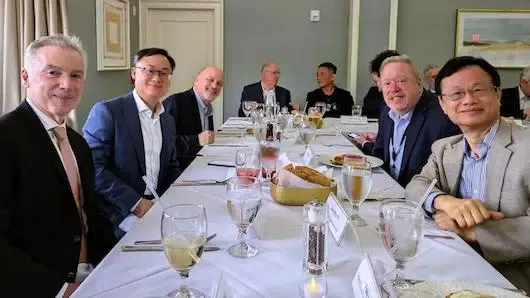
SelectUSA Highlights Taiwan’s Quantum Sector for Second Consecutive Year
Quantum NIL Joins Delegation to Explore Tech Collaboration
Strengthening Semiconductor Ties through AI & Quantum Visits
Quantum Computing as the Next Hope for AI Efficiency


Quantum NIL joins U.S. tech exchange delegation to explore opportunities in AI and quantum innovation
The SelectUSA Investment Summit, a key initiative by the U.S. government to attract global direct investment, has become a vital platform showcasing the deep economic and industrial collaboration between the U.S. and Taiwan. Each year, major Taiwanese companies form delegations to participate in the event, signaling strong bilateral ties.
With the support of the American Institute in Taiwan (AIT), Taiwanese tech firms visited the U.S. in June 2024 and again in May 2025. Notably, quantum technology has been a central theme for two consecutive years, with artificial intelligence (AI) added to the focus this year.
Quantum NIL, a startup specializing in nanoimprint lithography (NIL) for quantum applications, participated in the exchange delegation led by AIT. CEO Dr. Sean Lin was invited for the second year to engage in strategic discussions with listed financial firms, Taiwan’s Industrial Technology Research Institute (ITRI), and Foxconn Research Institute, among others.
AIT’s mission to build bridges between top Taiwanese and U.S. innovators supports the development of next-generation industries. Last year’s delegation visited leading quantum hubs in Colorado and Montana. This year’s itinerary included premier academic and industry leaders in AI, semiconductors, and quantum science—such as the Massachusetts Institute of Technology (MIT) and IBM’s research labs—offering delegates deep insight into future technology directions.
Dr. Lin emphasized that while Taiwanese companies may not match U.S. firms in the scale of frontier R&D, they possess world-class manufacturing expertise and rich datasets. He noted that Taiwan’s leadership in advanced semiconductor processes remains unchallenged, and AI chip manufacturing is tightly coupled with this technological advantage.
Modern AI relies heavily on GPUs that break from traditional computing paradigms. However, their high energy consumption poses major challenges. In contrast, quantum computers offer faster and more energy-efficient processing, making them a promising foundation for next-generation AI workloads.

As the U.S. aggressively promotes domestic manufacturing, it also signals strategic intentions to attract Taiwanese tech firms to invest and establish operations stateside. While Taiwan’s manufacturing strength is globally recognized, Dr. Lin believes the U.S. continues to lead in trend-setting and innovation.
This year’s Taiwan-U.S. exchange aimed to help Taiwan’s AI and quantum leaders understand how top U.S. R&D institutions and enterprises view technology development, commercialization models, and future market directions—ultimately enabling Taiwan to align with global trends and secure its role in future supply chains.
Dr. Lin noted that Taiwan’s manufacturing sector has amassed valuable datasets over decades, forming a strong foundation for AI applications. Taiwan and the U.S. thus offer highly complementary capabilities, particularly in fields like precision medicine and AI healthcare.
Quantum NIL’s roots in NIL commercialization date back to 2007. The company has continued to refine hybrid NIL technology, integrating it with traditional lithography to bridge functional gaps. Today, it collaborates closely with partners in the U.K., where the government prioritizes quantum technology with strategic funding and policies.
With NIL technology at the intersection of AI and semiconductor innovation, Quantum NIL is positioning itself as a key enabler in the emerging global quantum ecosystem.
